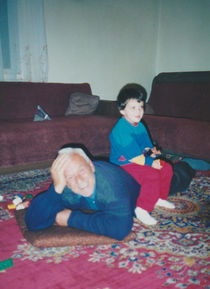
Prishtina
My homebase in Kosova was the capital city of Prishtina. I am deeply grateful to the families I lived with there who treated me like part of their families, helped me adapt to life there, learn Albanian, and become part of a wonderful, densely populated neighborhood—a lively microcosm of Kosova.
During my first years in Prishtina, working on the research for my Master’s Thesis (1981-1983), I lived with the Rexhepagiç family – Ferka, Isa, and their daughter Valentina. They had a beautiful house on Bregu i Diellit (Sunshine Hill), where I had a cozy room on the lower level. They were such generous hosts to me, bringing me into the life and intrigues of the neighborhood.
A few years later (1986-1988), I returned to Kosova to do the research for my PhD Dissertation. I stayed in the same Bregu i Diellit neighborhood, moving in the Sadiku family – Feride, Feriz and their adult children: daughters Rafete and Sadete, sons Tefik (and his wife Buqe), Fatmir (and his wife Jasmine), and their children. Feride and Feriz were like parents to me, giving me the full experience of a traditional Albanian lifestyle.
In 1994, the British humanitarian aid organization Oxfam hired me to direct rural development projects in the County of Viti, an hour south of Prishtina. In 1997, I began working for International Rescue Committee (IRC), directing projects in the neighboring county of Gjilanë. While working in the field, my son I and I stayed with the Tafa family in the village of Terpez. But our homebase was in another part of Prishtina. During our Oxfam years, we had an apartment and office in the Taslixhe neighborhood with the Demiri family. When the work with IRC began, we rented a big house in Dragodan to accommodate a bigger team, more projects, and international visitors.
I enjoyed wonderful conversations with scholars at the University of Prishtina and the Albanian Institute, especially with folklorist Anton Çetta, ethnomusicologist Rexhep Munishi, and Ibrahim Rugova, a journalist who edited its periodical, Gjurmime Albanologjike (Albanian Research - a critical resource for me), and who served as Kosova’s President from 1992 to 2006.
During those first years in Prishtina I also danced with Shota, Kosova’s professional folklore ensemble. Rehearsing with fabulous dancers and musicians as the snow fell outside their warm and welcoming rehearsal room was heaven for me! Their Artistic Director, Xhemali Berisha, became a very good friend, and during breaks talked with me about the folklore and history of Opoja, his beloved birthplace, and taught me Këllçoja, the series of eleven men’s dances unique to that region. Xhemali was a tremendous help to me during my years in Kosova, sharing with me his deep love for and knowledge of Albanian traditions.
I had friends from all walks of life in Prishtina: elite urbanites, villagers, television personalities, bread bakers from Has, and Roma (Gypsy) families. I also made a very special friend, Igballe Rogova. When I met her, Igo was a young woman in her early twenties, and we became best friends. She was like no one else I knew in Kosova. While most girls her age, when not in school, were concerned with things appropriate for girls—maintaining their reputations, being dutiful daughters, and finding husbands—Igo was out exploring life, meeting people, doing things, and learning karate so she could defend herself in any situation. She had an amazing knack for languages and had picked up English so well, on her own, that she was hired as the lead translator for the television station, creating the Albanian subtitles for their many English language films. That’s what she was doing when I met her.
Igo’s family were city people, originally from Gjakova. She was keen to accompany me to the remote villages of Opoja and Has. Unlike most city girls who wanted to keep their distance from village culture, Igo was fascinated by it and drawn to the people and their stories. Our expeditions were to have a major impact on Igo’s life. In the mid-1990s, when I was working with the young women activists in Vitia, Igo started working with the women of Has, on the other side of Kosova, focusing on literacy. With her sister Safete, she founded Motrat Qiriazi (The Qiriazi Sisters), named after two sisters who dedicated their lives to the education and rights of Albanian women in the early 1900s. Motrat evolved into the Kosova Women's Network (Rrjeti i Grave), where Igo serves as Executive Director. The organization advocates on behalf of women and human rights at local, regional and international levels. I am honored to have known Igo those many years ago, when we were both discovering our calling in life.
























